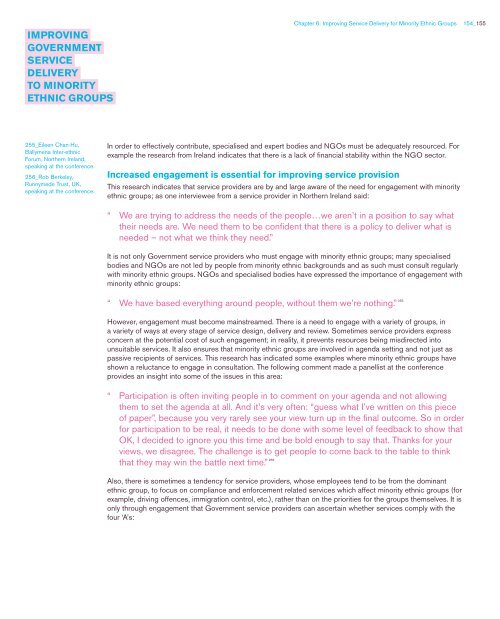improving government service delivery to minority ethnic ... - NCCRI
improving government service delivery to minority ethnic ... - NCCRI
improving government service delivery to minority ethnic ... - NCCRI
Create successful ePaper yourself
Turn your PDF publications into a flip-book with our unique Google optimized e-Paper software.
<strong>improving</strong><br />
<strong>government</strong><br />
<strong>service</strong><br />
<strong>delivery</strong><br />
<strong>to</strong> <strong>minority</strong><br />
<strong>ethnic</strong> groups<br />
Chapter 6: Improving Service Delivery for Minority Ethnic Groups 154_155<br />
255_Eileen Chan-Hu,<br />
Ballymena Inter-<strong>ethnic</strong><br />
Forum, Northern Ireland,<br />
speaking at the conference.<br />
256_Rob Berkeley,<br />
Runnymede Trust, UK,<br />
speaking at the conference.<br />
In order <strong>to</strong> effectively contribute, specialised and expert bodies and NGOs must be adequately resourced. For<br />
example the research from Ireland indicates that there is a lack of financial stability within the NGO sec<strong>to</strong>r.<br />
Increased engagement is essential for <strong>improving</strong> <strong>service</strong> provision<br />
This research indicates that <strong>service</strong> providers are by and large aware of the need for engagement with <strong>minority</strong><br />
<strong>ethnic</strong> groups; as one interviewee from a <strong>service</strong> provider in Northern Ireland said:<br />
“ We are trying <strong>to</strong> address the needs of the people…we aren’t in a position <strong>to</strong> say what<br />
their needs are. We need them <strong>to</strong> be confident that there is a policy <strong>to</strong> deliver what is<br />
needed – not what we think they need.”<br />
It is not only Government <strong>service</strong> providers who must engage with <strong>minority</strong> <strong>ethnic</strong> groups; many specialised<br />
bodies and NGOs are not led by people from <strong>minority</strong> <strong>ethnic</strong> backgrounds and as such must consult regularly<br />
with <strong>minority</strong> <strong>ethnic</strong> groups. NGOs and specialised bodies have expressed the importance of engagement with<br />
<strong>minority</strong> <strong>ethnic</strong> groups:<br />
“ We have based everything around people, without them we’re nothing.” 255<br />
However, engagement must become mainstreamed. There is a need <strong>to</strong> engage with a variety of groups, in<br />
a variety of ways at every stage of <strong>service</strong> design, <strong>delivery</strong> and review. Sometimes <strong>service</strong> providers express<br />
concern at the potential cost of such engagement; in reality, it prevents resources being misdirected in<strong>to</strong><br />
unsuitable <strong>service</strong>s. It also ensures that <strong>minority</strong> <strong>ethnic</strong> groups are involved in agenda setting and not just as<br />
passive recipients of <strong>service</strong>s. This research has indicated some examples where <strong>minority</strong> <strong>ethnic</strong> groups have<br />
shown a reluctance <strong>to</strong> engage in consultation. The following comment made a panellist at the conference<br />
provides an insight in<strong>to</strong> some of the issues in this area:<br />
“ Participation is often inviting people in <strong>to</strong> comment on your agenda and not allowing<br />
them <strong>to</strong> set the agenda at all. And it’s very often: “guess what I’ve written on this piece<br />
of paper”, because you very rarely see your view turn up in the final outcome. So in order<br />
for participation <strong>to</strong> be real, it needs <strong>to</strong> be done with some level of feedback <strong>to</strong> show that<br />
OK, I decided <strong>to</strong> ignore you this time and be bold enough <strong>to</strong> say that. Thanks for your<br />
views, we disagree. The challenge is <strong>to</strong> get people <strong>to</strong> come back <strong>to</strong> the table <strong>to</strong> think<br />
that they may win the battle next time.” 256<br />
Also, there is sometimes a tendency for <strong>service</strong> providers, whose employees tend <strong>to</strong> be from the dominant<br />
<strong>ethnic</strong> group, <strong>to</strong> focus on compliance and enforcement related <strong>service</strong>s which affect <strong>minority</strong> <strong>ethnic</strong> groups (for<br />
example, driving offences, immigration control, etc.), rather than on the priorities for the groups themselves. It is<br />
only through engagement that Government <strong>service</strong> providers can ascertain whether <strong>service</strong>s comply with the<br />
four ‘A’s:
















